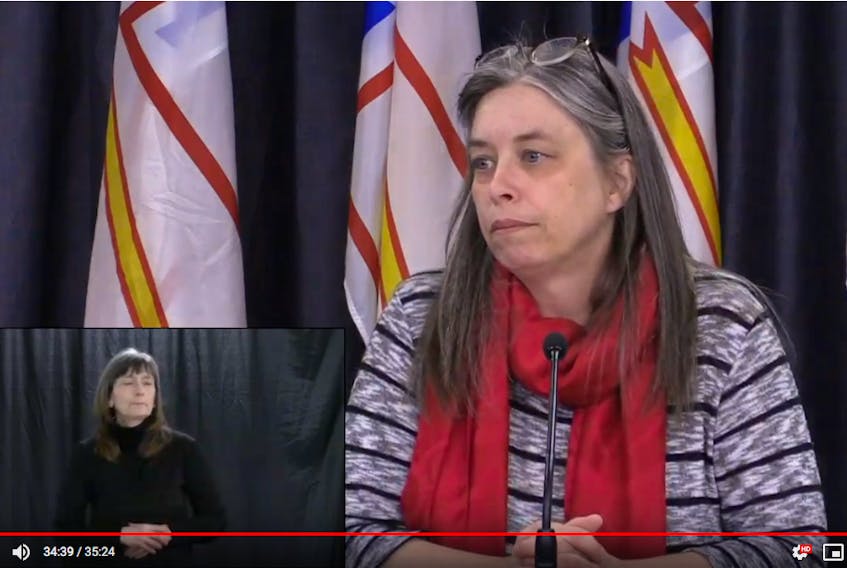ST. JOHN'S, N.L. — After more than a week of many people being on lockdown over a microbe, Dr. Janice Fitzgerald understands children and adults in this province may be going a little shack wacky.
Especially children.
“Many children may be feeling anxious or worried. We need to support them, help them adjust to their new routines and help them cope,” she told reporters at her daily news briefing on the COVID-19 crisis.
“Children learn from watching how their parents cope in times of stress.”
The province shut down schools Monday over growing concerns about the novel coronavirus pandemic, which has infected almost 240,000 people globally.
Canada had 736 confirmed cases as of Thursday afternoon. Three of those are in this province.
Key coronavirus news
• NL cases remain at three
• No violations under Public Health Act
• Miawpukek First Nation declares emergency
• Canada suspends passport service
• No new cases in Wuhan for first time
For up-to-date information on coronavirus, visit our COVID-19 news centre at saltwire.com
On Wednesday, the province went a step further and invoked the Public Health Act to enforce two-week quarantines for those coming back from international travel, as well as the closure of gyms, fitness facilities, bars, cinemas, arenas, performance spaces and bingo halls.
Fitzgerald said she’s unaware of any violations so far.
As for keeping kids occupied, she encouraged a variety of activities such as singing songs, dancing, playing in their own backyards, reading books and going for walks.
Playdates and sleepovers are not advisable, however. Instead, she said, children and adults should take advantage of social media as well as video linkups such as Skype or Facetime.
“Daily routines such as regular bedtimes and meals are important for children and teens,” she added.
What about adults who are also feeling stressed or anxious?
“Please know that these feelings are a normal reaction to what we are going through and you are not alone.” she said, recommending those seeking help or comfort should check out the website Bridgethegapp.ca.

Resources taxed
Fitzgerald said the provincial health line, 811, continues to experience high volumes, and those calling for advice on whether they should be tested for COVID-19 could wait as long as 24 hours for a callback. Several nurses and phone lines have been added, and callers are asked to be patient.
“Everyone who needs to be tested will be tested.”
To lessen the number of calls, the department is encouraging people to check out the website 811healthline.ca, where they can use a self-assessment tool.
For now, it’s mostly only people arriving back from international travel with COVID-19 symptoms — fever, cough and difficulty breathing — that are being tested, but even asymptomatic passengers are required to self-quarantine.
Fitzgerald said there are no restrictions for interprovincial travel yet, but those passengers are still welcome to stay self-quarantined for 14 days if they want.
“We would certainly encourage that for anyone who has travelled outside the province, if they feel they can, once they get home, for two weeks.”
Those in self-quarantine (who don’t exhibit any symptoms) are encouraged to get outside for walks if they can, as long as they keep two arms’ length away from others.
Those who are self-isolating because of flu-like symptoms must remain home and avoid as much contact as possible with others in the home.
Chief declares emergency measures
Meanwhile, the Miawpukek First Nation in Conne River implemented a state of emergency in its jurisdiction Thursday.
In a statement, Chief Misel Joe says the measures are “designed to continue our approach in doing everything and anything we can on our part to ensure COVID-19 is contained nationally and provincially and does not come to Miawpukek First Nation.”
Miawpukek First Nation declares 'State of Local Emergency'Chief & Council is following the lead of the provincial government and declares 'State of Local Emergency' for Miawpukek First Nation.
Posted by Miawpukek Mi'kamawey Mawi'omi on Thursday, March 19, 2020
Fitzpatrick said she’s unaware if any central testing facilities are in the works, as that is the purview of regional health authorities.
“As soon as the regional health authorities are ready to go ahead with any type of assessment centres, I am confident the public will know,” she said.
And she had some advice about hoarding goods such as toilet paper.
“I think to some degree it fuels panic and hysteria, and we have to be very careful about that. We are being cautious because we want to reduce the spread of this virus, but we have to at the same time realize that we don’t have to be alarmist about it.”
More information is available online at gov.nl.ca/covid-19.
Peter Jackson is a Local Journailism Initiative reporter covering health care for The Telegram.









